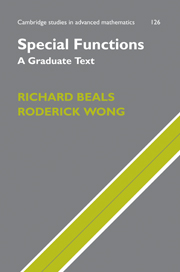Book contents
- Frontmatter
- Contents
- Preface
- 1 Orientation
- 2 Gamma, beta, zeta
- 3 Second-order differential equations
- 4 Orthogonal polynomials
- 5 Discrete orthogonal polynomials
- 6 Confluent hypergeometric functions
- 7 Cylinder functions
- 8 Hypergeometric functions
- 9 Spherical functions
- 10 Asymptotics
- 11 Elliptic functions
- Appendix A Complex analysis
- Appendix B Fourier analysis
- Notation
- References
- Author index
- Index
1 - Orientation
Published online by Cambridge University Press: 05 June 2012
- Frontmatter
- Contents
- Preface
- 1 Orientation
- 2 Gamma, beta, zeta
- 3 Second-order differential equations
- 4 Orthogonal polynomials
- 5 Discrete orthogonal polynomials
- 6 Confluent hypergeometric functions
- 7 Cylinder functions
- 8 Hypergeometric functions
- 9 Spherical functions
- 10 Asymptotics
- 11 Elliptic functions
- Appendix A Complex analysis
- Appendix B Fourier analysis
- Notation
- References
- Author index
- Index
Summary
The concept of “special function” is one that has no precise definition. From a practical point of view, a special function is a function of one variable that is (a) not one of the “elementary functions” – algebraic functions, trigonometric functions, the exponential, the logarithm, and functions constructed algebraically from these functions – and is (b) a function about which one can find information in many of the books about special functions. A large amount of such information has been accumulated over a period of three centuries. Like such elementary functions as the exponential and trigonometric functions, special functions arise in numerous contexts. These contexts include both pure mathematics and applications, ranging from number theory and combinatorics to probability and physical science.
The majority of the special functions that are treated in many of the general books on the subject are solutions of certain second-order linear differential equations. Indeed, these functions were discovered through the study of physical problems: vibrations, heat flow, equilibrium, and so on. The associated equations are partial differential equations of second order. In some coordinate systems, these equations can be solved by separation of variables, leading to the second-order ordinary differential equations in question. (Solutions of the analogous first-order linear differential equations are elementary functions.)
- Type
- Chapter
- Information
- Special FunctionsA Graduate Text, pp. 1 - 17Publisher: Cambridge University PressPrint publication year: 2010



